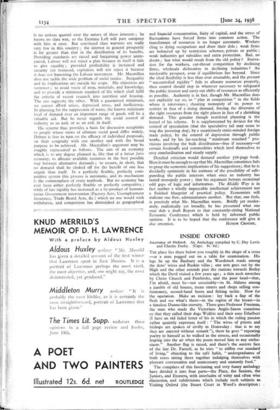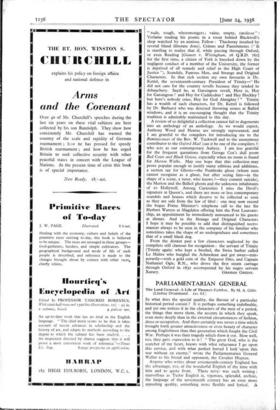INSIDE OXFORD
THE place lies there below you roughly in the shape of a cross —or a man pegged out on a table for examination. His legs lie up the Banbury and the Woodstock roads among the dons' wives and Ruskin villas ; one arm goes out by the High and the other extends past the stations towards Botley which the Devil visited a few years ago ; a thin neck stretches by Christ Church and Pembroke, and the poor head—that, I'm afraid, must lie—not unsuitably—in St. Aldates among a jumble of old houses, mean streets and shops selling con- fectionery, second-hand boots and fishing tackle. Now for the operation. Make an incision : lay back a flap of the flesh and see what's there—in the region of the breast—in a timeless Dunne-like eternity_ There goes Professor Freemen, the man who made the Victorians Anglo-Saxon conscious so that they called their dogs Wulfric and their sons Ethelbert (I have an old faded letter of his in which the ruling passion rather quaintly expresses itself : " The wives of priests and bishops are. spoken of civilly in Domesday : that is to say they are entered without remark"), there he goes " repeating poetry to himself as he walked in the streets, and occasionally leaping into the air when the poem moved him to any enthu- siasm." Another flap is raised, and there's the austere face of the late Dr. Farnell, as he tries " to stiffen our standard of living," objecting to the cafe habit, " undergraduates of both sexes sitting there together indulging themselves with pleasant conversation and unnecessary and unmanly food."
The compilers of this fascinating and very funny anthology have divided it into four parts—the Place, the Seniors, the Juniors, and Etcetera, with interludes of witty and often wise discussion, and subdivisions which include such subjects as Visiting Oxford (the Stuart Court in Wood's description :
" rude, rough, whoremongers ; vaine, empty, carelesse " : Verlaine reading his poems in a room behind Blackwell's shop watched by an anxious Fellow : Thackeray insulted by several bland illiterate dons), Crimes and Punishments (" It is startling to realise that if, while passing through Oxford, or even Reading [Ginnett v. Wittingham, 16 Q.B.D. 76i] for the first time, a citizen of York is knocked down by the negligent conduct of a member of the University, the former is deprived of all remedy and relief in the High Court of Justice "), Scandals, Famous Men, and Strange and Original Characters. In that rich section my own favourite is Dr. Kettel, the seventeenth-century President of Trinity—" He did not care for the country revels because they tended to debauchery. Sayd he, at Garsington revell, Here is, Hey for Garsington ! and Hey for Cuddesdon ! and Hey Hocldey ! but here's nobody cries, Hey for God Almighty ! " Trinity has a wealth of such characters, for Dr. Kettel is followed by Dr. Bathurst who was detected throwing stones at Balliol windows, and it is an encouraging thought that the Trinity tradition is admirably maintained to this day.
A review of so delightful a collection cannot fail to degenerate into an anthology of an anthology. As we would expect, Anthony Wood and Hearne are strongly represented, and I am grateful to the compilers for introducing me to the Reminiscences of the Rev. W. Tuckwell and to the anonymous contributor to the Oxford Mail (can it be one of the compilers ?) who acts as our contemporary Aubrey. I am less gratefill for the frequent quotations from George Cox's dull poem Red Coats and Black Gowns, especially when no room is found for Merton Walks. May one hope that this collection may prove popular enough to justify many editions and additions, a section say for Ghosts—the Pembroke ghost (whom men cannot recognise as a ghost, but after seeing him—in the shape of a scout, a tutor, who knows ?—they commit suicide), the Merton and the Balliol ghosts and the unknown inhabitants of to Hollywell. Among Curiosities I miss the Devil's signature at Queen's, and there are more or less contemporary scandals and hoaxes which deserve to be collected as soon as they are safe from the law of libel : one may now record the bogus Prime Minister's telephone call to the late Sir Herbert Warren at Magdalen offering him the Poet Laureate- ship, an appointment he immediately announced to his guests at dinner. And to the Strange and Original Characters I hope it may be possible to add that distinguished necro- mancer always to be seen in the company of his familiar who sometimes takes the shape of an undergraduate and sometimes that of a small black dog.
From the distant past a few characters neglected by the compilers still clamour for recognition : the servant of Trinity (Trinity again) who kept a brothel, the Swiss barber called Le Maitre who burgled the Ashmolean and got away—tem- porarily—with a gold coin of the Emperor Otto, and Captain Nathaniel Ogle, R.N., who drove the first steam carriage through Oxford in 1832 accompanied by his negro servant















































 Previous page
Previous page